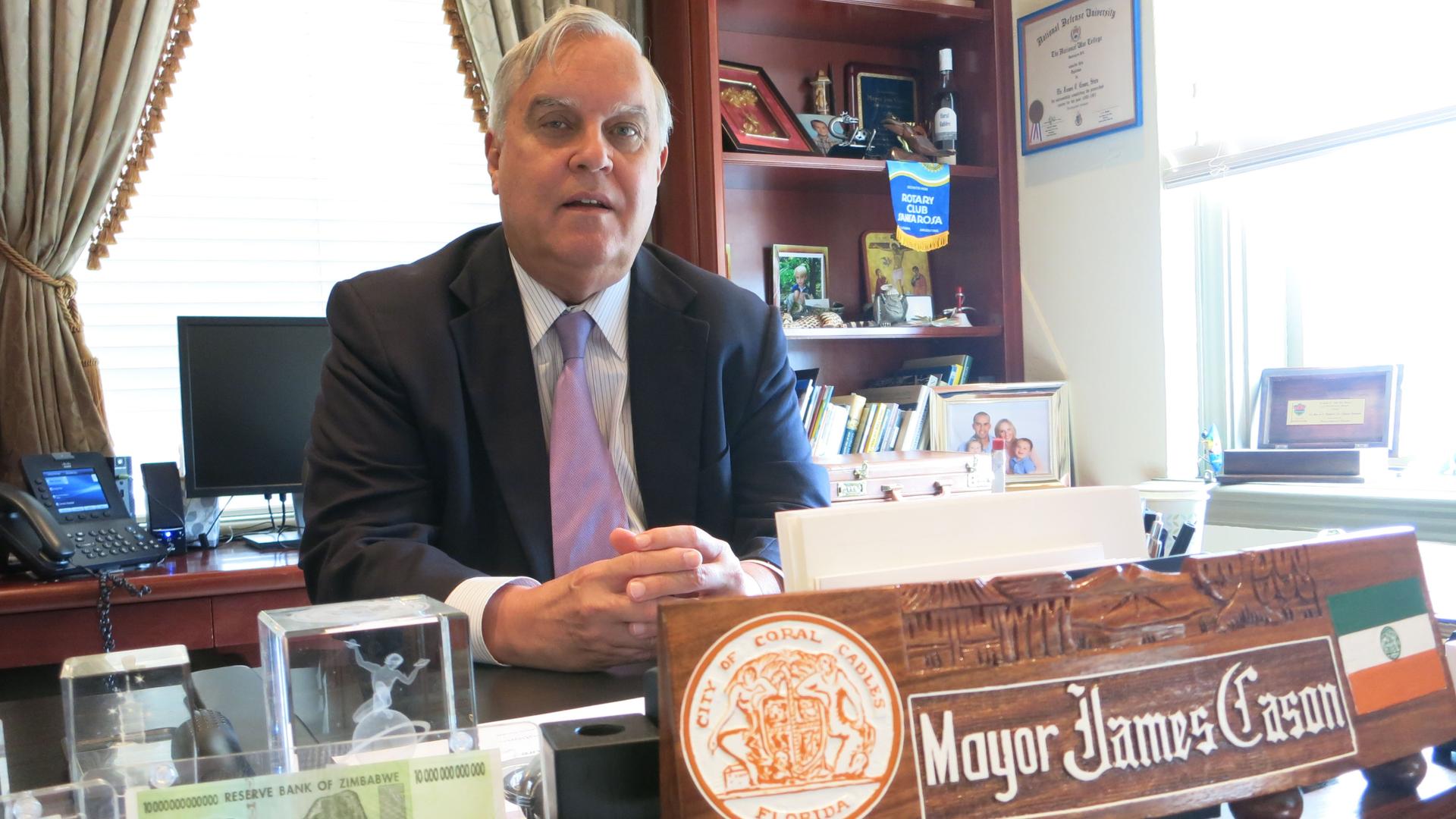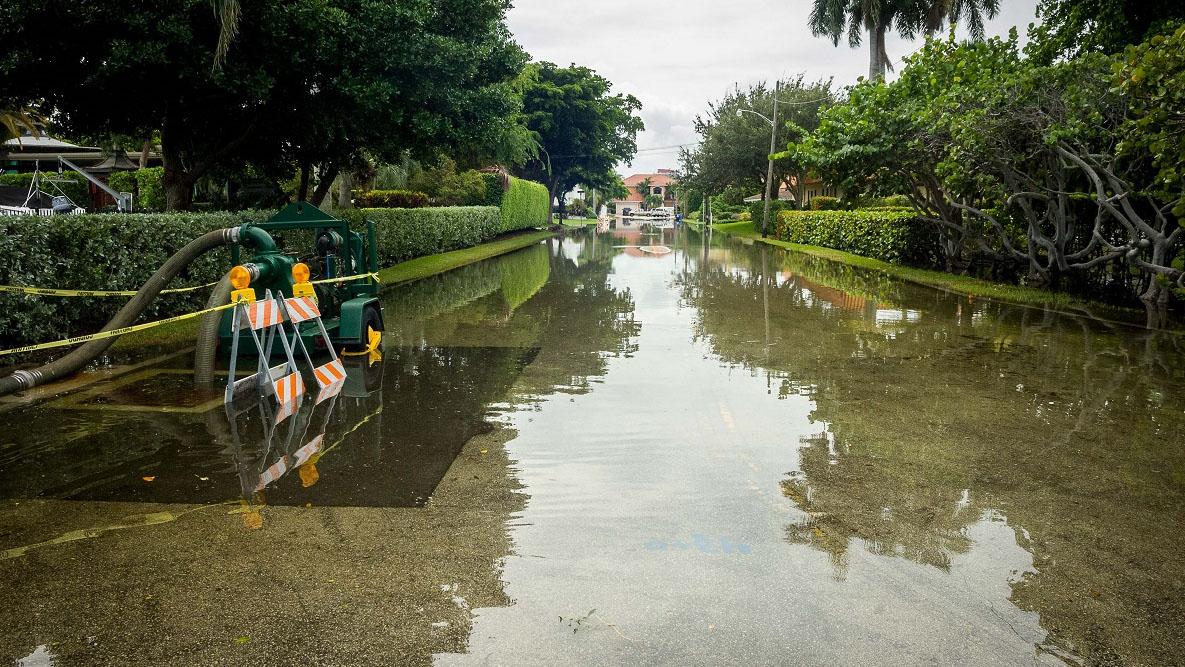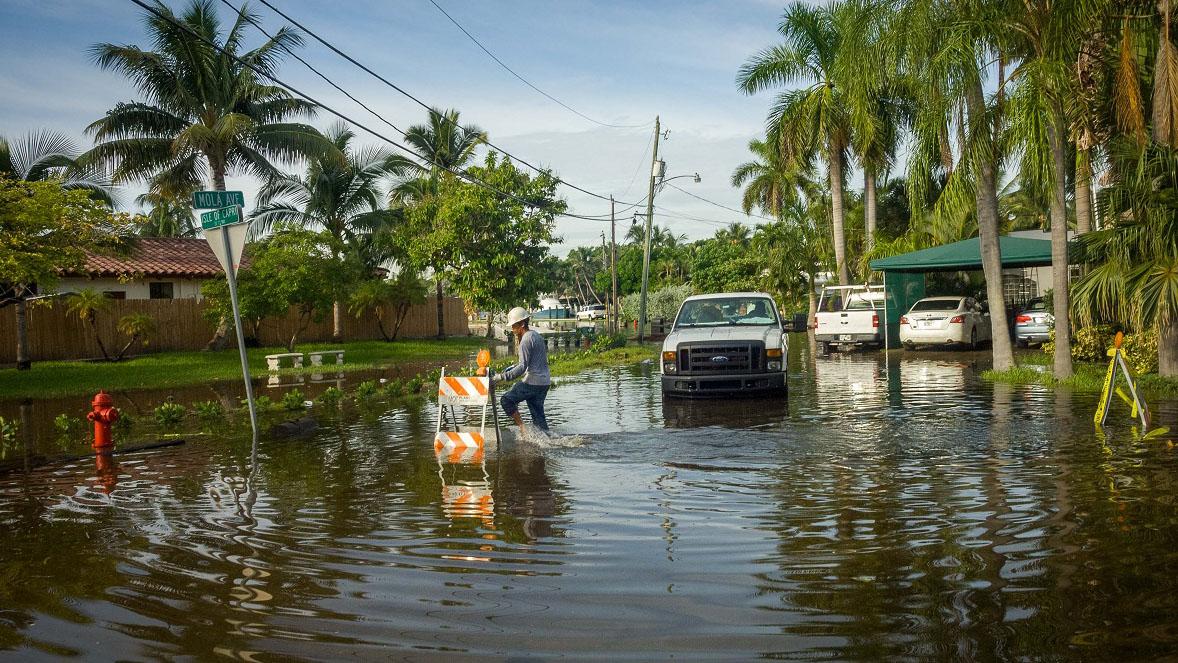South Florida Republicans are fed up with their party leaders on climate change
For cities along Florida's Atlantic coast, flooding from high tides has already become a reality. Fort Lauderdale, Fla., September 2015.
For Jim Cason, the Republican mayor of Coral Gables, Florida, climate change is very real.
On a recent day he was looking at a newly drawn elevation map of his city of 50,000 on Florida’s Atlantic coast right next to Miami.
The map shows that big swaths of his city are already at, or barely above, sea level.
"One foot, zero, two feet," Cason said, pointing to the most vulnerable areas.
During very high tides these days, called “king tides,” streets in South Florida regularly flood.
About $3 billion in high-end real estate runs along the shore here, and Cason said the city has little power to protect it from rising waters.
“Other places can build walls, berms, sand dunes and so on. We’re on coral, which means the water will be coming up from the bottom,” he said in a recent interview.
“Building a wall is not a solution for our part of the country.”
Sea levels have risen almost an inch a year here over the last few years. And conservative projections estimate they’ll rise 3 feet more this century.
Florida as a whole faces one of the biggest risks from climate change and sea level rise in the US. One recent study calculated that nearly $70 billion in coastal property “will likely be at risk” from flooding in the state within just 15 years.
Related: Don't let Antarctica's size fool you. It's melting faster than ever.
So what’s the solution here?
“You have to hope we slow down the melting of the ice," Cason said, "because our future is the future of ice.”
But halting melting polar ice will take leadership far beyond Coral Gables. And Cason doesn’t see that coming from his fellow party members in higher office.
Florida’s Republican Gov. Rick Scott’s office allegedly told state employees they couldn’t even use the terms “climate change” or “global warming.” Scott has denied this, but his office also denied a request to speak with him, or anybody else in his administration, about climate change.
At the federal level, Florida senator and former presidential candidate Marco Rubio is in line with many leading Republicans in dismissing or minimizing the threat of climate change. So are the party’s two leading remaining candidates for president, Donald Trump and Ted Cruz.
Trump has said global warming is a hoax created by the Chinese to make the US less competitive. Cruz calls it “pseudo-scientific theory.”
Add it all up, it’s creating a bit of an identity crisis for Mayor Cason.
“It’s making it harder to be a Republican when you have nobody in the party that wants to recognize it,” said Cason. “That’s why we’re hoping that we can get the candidates to take a closer look at the scientific evidence and tell us: if you don’t believe it, well why? Or you think it’s irrelevant because you don’t live along the coasts. We live along the coast.”

Cason is one of 21 Florida mayors, Republicans and Democrats, who sent a letter to all the presidential candidates of both major parties imploring them to pay attention to climate science.
“If you’re a mayor, it doesn’t matter if you’re a Democrat or a Republican,” said Christina DeConcini, director of government affairs at the nonpartisan World Resources Institute in Washington.
“If the water is coming, and you need to protect your citizens, you’re going to do that. You’re not going to debate whether it’s happening or not. It’s a reality.”
In Hollywood, Florida, just up the coast from Coral Gables, water regularly bubbles up from storm drains and the soil during high tides. On a recent stroll through town, DeConcini stopped in front of a home at the edge of a lake, where a resident had built a crude wall of dirt and stones.
“The people that built this wall here are trying to protect their own property,” she said.
But it won’t be nearly enough to keep the waters at bay. Broward County leaders know this and are considering drastic adaptation solutions, like converting a local golf course into a giant bathtub that could hold water during floods. But even that would be just a small, short-term fix. This area will need much more help, and DeConcini is frustrated by the local-state-federal divide.
“People in Washington, or in Tallahassee, just seem like they’re living on a different planet.”
DeConcini isn’t singling out Republicans. And she does see some glimmers of hope from the GOP.
She points to a new bipartisan climate caucus in the House started by US Rep. Carlos Curbelo, a Republican from Miami.
And 11 Republican members of Congress signed a resolution that recognizes human-caused climate change and calls for steps to fight it.
But the statement offers no specifics, fewer than 5 percent of House Republicans signed it, and those that did, don’t seem to want to talk about it. The authors of the resolution turned down requests for an interview.
John Gable, a former Republican operative in Washington, wasn’t surprised.
“You don’t necessarily want to go on radio because you might say something that’s a little bit too moderate," Gable said. "And you’ll get in trouble.”
Gable said talking too much about climate change can alienate core Republicans.
He's trying to help change that through a new group called “All Sides,” which is seeking to overcome bipartisanship on a number of issues. Gable believes a middle ground can be found, and that taking action on climate change can become less toxic for Republicans.
Mayor Cason of Coral Gables isn’t so optimistic.
“I don’t think they will" take climate change more seriously, he said. "I don’t know why.”
Other local South Florida leaders also say the time for a middle ground has passed. Nearby Miami Beach has already spent $100 million on defenses against rising waters, and that’s almost certainly just the beginning.

We want to hear your feedback so we can keep improving our website, theworld.org. Please fill out this quick survey and let us know your thoughts (your answers will be anonymous). Thanks for your time!
